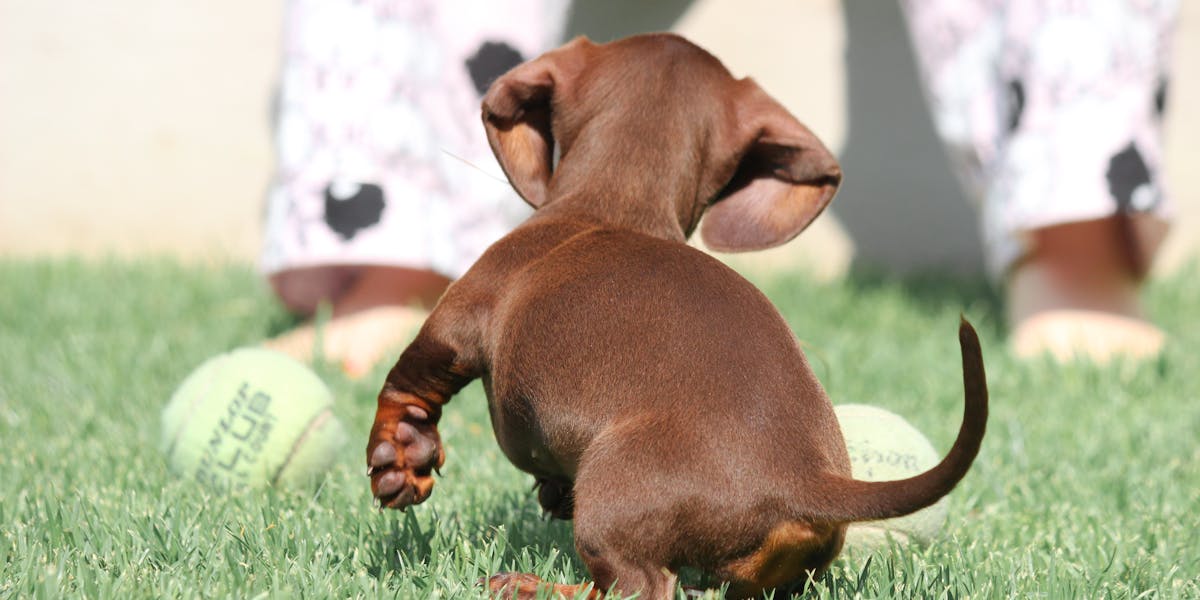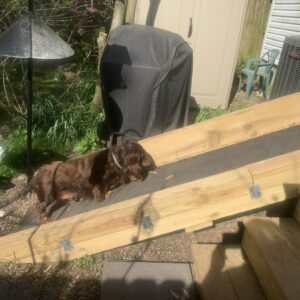The dachshund digging problem is a common concern among pet owners who adore this affectionate and spirited breed. Dachshunds, with their curious nature and playful demeanor, often find themselves digging for various reasons. Understanding the underlying causes of this behavior is crucial for any owner looking to maintain a peaceful and safe environment for their furry friend. In this article, we will explore the reasons behind dachshund digging, effective solutions, and techniques to prevent future issues. By addressing the factors contributing to this behavior, you’ll be equipped to create a harmonious home for your dachshund.

Understanding the Dachshund Digging Problem
Dachshunds are known for their playful and curious nature, but their digging behavior can become a concern for many owners. Understanding why these dogs dig is essential to address the problem effectively.
Digging is a natural behavior for many dog breeds, including Dachshunds. This breed was originally bred for hunting small animals, which often involved digging. Thus, their instinct to dig is deeply rooted.
Here are some common reasons why Dachshunds may dig:
- Instinctual behavior: As mentioned, their hunting background drives them to dig.
- Curiosity: Dachshunds are naturally curious and may dig to explore their surroundings.
- Seeking comfort: They may dig to create a comfortable spot to rest or escape the heat.
- Attention-seeking: If they notice that digging gets a reaction from their owners, they may continue the behavior.
- Anxiety or boredom: Lack of mental stimulation or exercise can lead to destructive digging.
Understanding these motivations can help you address the digging behavior more effectively. Recognizing that it is often not just a mischievous act but rather a response to their instincts or environment is crucial.
By identifying the underlying reasons for your Dachshund’s digging, you can take appropriate steps to manage and redirect this behavior.

Common Triggers for Dachshund Digging
Understanding why your Dachshund digs is crucial for addressing the behavior. Here are some common triggers that may lead to digging:
- Boredom: Dachshunds are intelligent dogs that need mental stimulation. Without enough activities, they may dig to entertain themselves.
- Instinct: As a breed originally used for hunting, digging is a natural instinct. They may dig to explore or hunt for small animals.
- Stress or Anxiety: Changes in the environment, such as new people or animals, can cause stress. This anxiety may lead to digging as a coping mechanism.
- Temperature Regulation: Dogs sometimes dig to create a cooler or warmer spot in the ground, depending on the weather.
- Attention-Seeking: If your Dachshund notices that digging gets your attention, they may continue the behavior to receive more interaction.
- Territorial Behavior: Dogs may dig to mark their territory or to create a safe space for themselves.
Recognizing these triggers can help you provide better care and address the digging behavior effectively.

Effective Solutions for Dachshund Digging
To effectively manage and reduce your Dachshund’s digging behavior, consider implementing the following strategies:
- Provide Mental Stimulation: Engage your Dachshund with puzzle toys and interactive games. This helps to keep their minds active and reduces boredom.
- Designate a Digging Area: Create a specific spot in your yard where your Dachshund is allowed to dig. Fill it with sand or loose soil to encourage digging in that area only.
- Use Positive Reinforcement: Reward your Dachshund with treats and praise when they dig in the designated area or stop digging when asked.
- Increase Exercise: Regular walks and playtime can help burn off excess energy. A tired dog is less likely to dig.
- Distract with Toys: Provide a variety of chew toys and balls to keep your Dachshund entertained and less focused on digging.
- Monitor Their Environment: Ensure that your yard is free of any potential digging triggers, such as small animals or interesting scents.
- Use Deterrents: Consider using natural deterrents like citrus peels or vinegar in areas where your Dachshund tends to dig.
- Teach Commands: Train your Dachshund to respond to commands like “leave it” or “no dig” to help manage their digging behavior.
By implementing these effective solutions, you can help your Dachshund develop better habits and enjoy a more peaceful outdoor experience.

How to Prevent Your Dachshund from Digging
Preventing your Dachshund from digging requires a combination of training, environmental management, and engagement. Here are some effective strategies to keep your furry friend from turning your yard into a digging site:
1. Provide Adequate Exercise
Ensure your Dachshund receives plenty of physical activity. A tired dog is less likely to dig. Try to:
- Take daily walks
- Engage in play sessions
- Provide interactive toys
2. Create a Designated Digging Area
If your dog enjoys digging, consider creating a specific area where it is allowed to dig. This can be a sandbox or a designated patch in the yard. Make it appealing by:
- Adding toys
- Encouraging playtime there
3. Use Positive Reinforcement
When your Dachshund chooses not to dig, reward it with treats and praise. This positive reinforcement helps to:
- Encourage good behavior
- Strengthen your bond
4. Supervise Outdoor Time
Keep an eye on your Dachshund when it is outside. If you notice signs of digging, redirect its attention to a toy or activity. This supervision can:
- Prevent bad habits from forming
- Help you intervene early
5. Address Boredom
Boredom can lead to destructive behaviors like digging. To combat this, try:
- Rotating toys regularly
- Engaging in new activities
6. Use Barriers
Consider installing barriers or fencing to limit access to areas where digging is not allowed. This can be an effective way to:
- Protect your garden
- Keep your Dachshund safe
7. Monitor for Stress Triggers
If your Dachshund digs due to anxiety or stress, identifying the triggers is essential. Work on:
- Reducing stressors in the environment
- Providing a calm space for your dog
By implementing these strategies, you can significantly reduce your Dachshund’s digging behavior and create a more harmonious environment for both of you.

The Importance of Exercise for Dachshunds
Exercise is crucial for the overall health and well-being of Dachshunds. These small dogs, known for their long bodies and short legs, require regular physical activity to maintain a healthy weight and prevent behavioral issues.
Benefits of Regular Exercise
- Weight Management: Regular exercise helps to keep your Dachshund at a healthy weight, reducing the risk of obesity.
- Physical Health: Exercise strengthens their muscles and bones, promoting better mobility.
- Mental Stimulation: Engaging in physical activities can prevent boredom and reduce destructive behaviors.
- Socialization: Taking your Dachshund for walks or to dog parks allows them to interact with other dogs and people.
Recommended Activities
Here are some fun and effective ways to exercise your Dachshund:
- Daily Walks: Aim for at least 30 minutes of walking each day.
- Playtime: Engage in games like fetch or tug-of-war to keep them active.
- Obstacle Courses: Set up a mini obstacle course in your backyard for added fun and exercise.
- Swimming: If your Dachshund enjoys water, swimming is a great low-impact exercise.
Signs Your Dachshund Needs More Exercise
Pay attention to your Dachshund’s behavior. If they exhibit the following signs, it may be time to increase their activity levels:
- Excessive Barking: This can indicate boredom or pent-up energy.
- Destructive Behavior: Chewing on furniture or digging can be signs of insufficient exercise.
- Weight Gain: If your Dachshund is gaining weight, they may need more physical activity.
In conclusion, ensuring your Dachshund gets enough exercise is vital for their physical and mental health. By incorporating regular activities into their routine, you can help them lead a happier and healthier life.

Behavioral Changes to Address Digging
To effectively address your Dachshund’s digging behavior, it is essential to implement certain behavioral changes. These changes can help redirect their energy and focus, reducing the urge to dig.
1. Reinforce Positive Behaviors
Encouraging your Dachshund to engage in positive activities can help minimize digging. Use treats and praise when they play or relax in appropriate areas.
- Reward Calmness: Give treats when they stay calm in the yard.
- Redirect Attention: If they start to dig, guide them to a toy or game.
2. Increase Mental Stimulation
Providing mental challenges can keep your Dachshund engaged and less likely to dig. Consider the following:
- Puzzle Toys: Invest in toys that require problem-solving.
- Training Sessions: Regular training can stimulate their mind.
3. Establish a Routine
Having a consistent schedule can help your Dachshund feel more secure and reduce anxiety-related digging.
- Regular Walks: Take them for daily walks to expend energy.
- Playtime: Set aside time each day for interactive play.
4. Create a Designated Digging Area
If your Dachshund enjoys digging, consider creating a specific area where it is allowed. This can satisfy their instinct without damaging your yard.
- Use Sand or Soil: Fill the area with soft materials.
- Encourage Exploration: Hide toys or treats in this area to make it appealing.
5. Monitor and Adjust
Keep an eye on your Dachshund’s behavior and make adjustments as needed. If you notice patterns in their digging, adapt your approach accordingly.
By implementing these behavioral changes, you can effectively address your Dachshund’s digging habits and create a happier, more balanced pet.

When to Seek Professional Help for Digging Issues
If your Dachshund’s digging behavior becomes excessive or problematic, it may be time to consider professional help. Here are some signs that indicate you should seek assistance:
- Persistent Digging: If your dog digs regularly despite your best efforts to correct the behavior, it may be time to consult a professional.
- Destructive Behavior: Excessive digging that leads to damage in your yard or home can be a sign that your dog needs expert intervention.
- Injury Risk: If your dog is injuring themselves while digging, it’s crucial to seek help immediately to prevent further harm.
- Behavioral Issues: If digging is accompanied by other behavioral problems, such as aggression or anxiety, a professional can help address these underlying issues.
- Stress or Anxiety: If you notice signs of stress or anxiety in your dog, a professional can provide strategies to alleviate these feelings.
Professional trainers or animal behaviorists can offer tailored solutions to manage and redirect your Dachshund’s digging behavior. They can also help you understand the root causes and provide effective strategies to ensure your dog’s happiness and well-being.
Remember, seeking help is a proactive step in ensuring your dog’s health and maintaining a harmonious home environment.

Creating a Safe Outdoor Space for Your Dachshund
Creating a safe outdoor space for your Dachshund is essential for their well-being and happiness. Here are some key elements to consider:
Secure Fencing
Ensure your yard has secure fencing that is tall enough to prevent your Dachshund from jumping over. A fence should also be buried a few inches underground to stop them from digging under it.
Safe Plants and Flowers
Choose non-toxic plants and flowers for your garden. Some plants can be harmful if ingested, so it’s crucial to research before planting.
Shaded Areas
Provide plenty of shaded areas for your Dachshund to escape the sun. This can be done with trees, umbrellas, or dog houses. Keeping them cool is important, especially on hot days.
Comfortable Surface
Consider the ground surface in your outdoor space. A soft surface like grass or mulch is ideal for your Dachshund’s paws. Avoid sharp stones or gravel that can hurt them.
Interactive Toys
Include interactive toys in your outdoor space to keep your Dachshund entertained. This can help prevent boredom and reduce any digging tendencies.
Regular Supervision
Always supervise your Dachshund while they are outside. This ensures their safety and allows you to intervene if they start to dig or engage in other unwanted behaviors.
Designated Potty Area
Create a designated potty area to encourage your Dachshund to go in a specific spot. This helps keep your yard clean and teaches them where it’s acceptable to relieve themselves.
By following these tips, you can create a safe and enjoyable outdoor space for your Dachshund, allowing them to explore and play while staying protected.




